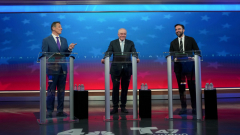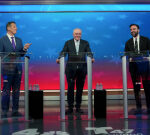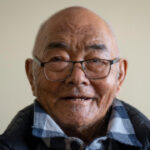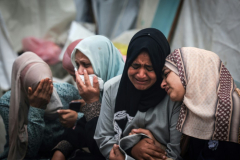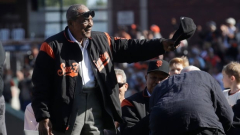With less than three weeks before the New York City mayoral race, the three leading candidates have squared off in the first of two televised debates.
Democratic socialist Zohran Mamdani continues to enjoy a commanding lead in the polls, but the two-hour-long face-off on Thursday provided an opportunity for his rivals to make their case – and attempt to close the gap.
Recommended Stories
list of 3 items
- list 1 of 3Cuomo wants to be New York City’s next mayor. Will his plans help the city?
- list 2 of 3Eric Adams says he is dropping out of New York City mayoral race
- list 3 of 3New York mayoral debate: What to know as Mamdani, Cuomo and Sliwa face off
end of list
Former New York Governor Andrew Cuomo and Republican Curtis Sliwa levelled familiar lines of attack against the 34-year-old Mamdani, an assemblyman who emerged as a breakout star in the Democratic Party.
While the contest is a municipal one, it carries national – if not international – implications.
Mamdani’s resounding primary victory in June against Cuomo sent shockwaves across the United States. It marked a high-profile victory for progressive Democrats as the party searches for new direction, following a trouncing in the 2024 general election.
It also represented a boost for pro-Palestine politics in the US. Mamdani is a vocal critic of Israel and its assault on Gaza, something many mainstream Democrats have been hesitant to speak out about.
That made him a potent contrast to Cuomo, who relaunched his candidacy as an independent following his primary loss.
Cuomo, once a household name in politics, had signed up last year to be part of the legal team defending Israeli Prime Minister Benjamin Netanyahu against war crime charges at the International Criminal Court (ICC).
Much of Thursday’s debate circled around the Mamdani-Cuomo rivalry and their different visions for the city.
The third candidate on the debate stage, Sliwa, struggled for airtime amid their harsh exchanges, leading him to describe the scene at one point as a “spat in the school yard”.
The election will take place on November 4. Here are five key takeaways from Thursday’s debate:
Israel-Palestine takes centre stage
Israel and Palestine are not part of New York City’s five boroughs, but Israel’s war on Gaza was among the earliest issues raised in the debate. And it kept resurfacing throughout the night.
Mamdani was asked about his comments to Fox News on Wednesday, where he did not take a clear position on calls for Hamas to disarm.
“Of course, I believe that they should lay down their arms,” Mamdani said of Hamas.
“I’m proud to be one of the first elected officials in the state who called for a ceasefire. And calling for a ceasefire … means all parties have to cease fire and put down their weapons.”
The Democratic nominee also stressed the need for addressing the root causes of the conflict: Israel’s siege, occupation and system of apartheid in the Palestinian territories.
The United Nations and the International Court of Justice have both declared that Israel’s occupation of the Palestinian territories is illegal.
Cuomo, sounding increasingly indignant, levelled unfounded accusations at Mamdani, claiming his criticisms of Israeli abuses were tantamount to an attack on the existence of the Israeli state.
“The assemblyman just said in his response, ‘Well, it depends on occupation,’” Cuomo replied, in a section of the debate about maintaining peace in the Middle East. “That is code, meaning that Israel does not have a right to exist as a Jewish state.”
Mamdani shot back by highlighting Cuomo’s ties to Netanyahu, a fugitive from international justice. The ICC issued a warrant for the Israeli leader’s arrest last year.
“The occupation is a reference to international law and the violation of it, which Mr Cuomo has no regard for since he signed up to be on Benjamin Netanyahu’s legal defence team during the course of this genocide,” Mamdani said.
Cuomo also tried to vilify Mamdani for not condemning the slogan “globalise the intifada” – a phrase some advocates use to call for international solidarity with the Palestinians’ struggle.
Intifada means uprising in Arabic. It is also the name given to two Palestinian revolts in the late 1980s and 2000s, which saw peaceful protests as well as violent attacks against Israelis.
“He still won’t denounce ‘globalise the Intifada’, which means kill all Jews,” Cuomo claimed.
Mamdani, meanwhile, said he has listened to Jewish New Yorkers who associate the phrase with suicide bombings against Israelis during the second Intifada, and he has since discouraged its use.
While Mamdani’s relationship with New York’s Jewish community has been a subject of media scrutiny throughout the campaign, the city is also home to the country’s largest Muslim population.
One of Thursday’s debate moderators asked Cuomo about his ties with the Muslim community. They noted that the former governor had called Mamdani, who is Muslim, a “terrorist sympathiser”.
Cuomo, who resigned in 2021 after multiple women accused him of sexual harassment, replied that he views Mamdani as “totally separate” from the Muslim community.
“I don’t think in any way the assemblyman is representative of the Muslim community, which is a vital community in New York City,” Cuomo said, adding that he was “very fond of” Muslims.
“I think he’s playing his own politics,” the ex-governor continued. “Many of his positions don’t even follow the Muslim faith.”
Mamdani retorted that it took being beaten by a Muslim candidate in the primaries for Cuomo to visit a mosque. Cuomo visited a New York City mosque for the fi

